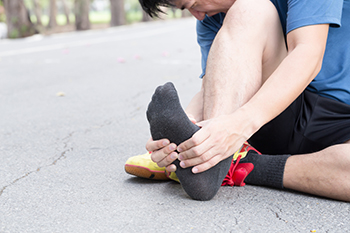
Plantar fasciitis is an inflammation of the thick band of tissue that runs from the toes to the heel under the foot. Known as the plantar fascia, this tissue is more likely to become damaged if you are middle-aged, overweight, or have a job that requires you to be on your feet for long periods. Plantar fasciitis is the most common cause of heel pain. It occurs mainly from overuse and is especially common among runners and other athletes that continually pound their feet on hard surfaces. Many people can reduce or even eliminate the effects of plantar fasciitis by resting, icing, and massaging the feet for 20 minutes a day. Other tips include wearing shoes with ample cushioning in the heel and arch support. A number of simple exercises can prove helpful in reducing the pain from plantar fasciitis. If these simple measures don’t work, please consult a podiatrist for a diagnosis and options for more advanced treatment.
Plantar fasciitis is a common foot condition that is often caused by a strain injury. If you are experiencing heel pain or symptoms of plantar fasciitis, contact one of our podiatrists from Foot & Ankle Associates of Maine. Our doctors can provide the care you need to keep you pain-free and on your feet.
What Is Plantar Fasciitis?
Plantar fasciitis is one of the most common causes of heel pain. The plantar fascia is a ligament that connects your heel to the front of your foot. When this ligament becomes inflamed, plantar fasciitis is the result. If you have plantar fasciitis you will have a stabbing pain that usually occurs with your first steps in the morning. As the day progresses and you walk around more, this pain will start to disappear, but it will return after long periods of standing or sitting.
What Causes Plantar Fasciitis?
- Excessive running
- Having high arches in your feet
- Other foot issues such as flat feet
- Pregnancy (due to the sudden weight gain)
- Being on your feet very often
There are some risk factors that may make you more likely to develop plantar fasciitis compared to others. The condition most commonly affects adults between the ages of 40 and 60. It also tends to affect people who are obese because the extra pounds result in extra stress being placed on the plantar fascia.
Prevention
- Take good care of your feet – Wear shoes that have good arch support and heel cushioning.
- Maintain a healthy weight
- If you are a runner, alternate running with other sports that won’t cause heel pain
There are a variety of treatment options available for plantar fasciitis along with the pain that accompanies it. Additionally, physical therapy is a very important component in the treatment process. It is important that you meet with your podiatrist to determine which treatment option is best for you.
If you have any questions, please feel free to contact our office located in Brunswick, ME . We offer the newest diagnostic and treatment technologies for all your foot care needs.
